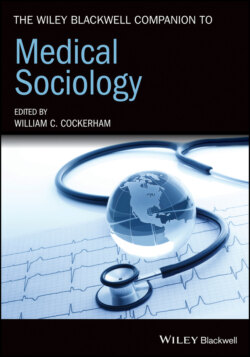Читать книгу The Wiley Blackwell Companion to Medical Sociology - Группа авторов - Страница 27
CONFLICT THEORY
ОглавлениеConflict theory, with its roots in the work of Karl Marx and Max Weber, joined symbolic interaction in significantly reducing the influence of structural-functionalism, but did not achieve a dominant position in medical sociology. Conflict theory is based on the assumption that society is composed of various groups struggling for advantage, that inequality is a basic feature of social life, and conflict is the major cause of social change. Marx’s perspective in conflict theory is seen in the rejection of the view expressed by structural-functionalism that society is held together by shared norms and values. Conflict theory claims that true consensus does not exist; rather, society’s norms and values are those of the dominant elite and imposed by them on the less privileged to maintain their advantaged position. Weber adds, however, that social inequality is not based on just money, property, and relationships to the means of production, but also on status and political influence. Since all social systems contain such inequality, conflict inevitably results and conflict, in turn, is responsible for social change.
Whereas the Marxian-oriented features of conflict theory have emphasized systemic exploitation and class struggle, other theorists have moved toward emphasizing conflicts that occur between interest groups and the unequal distribution of political power (Dahrendorf 1959). According to Bryan Turner (1988), modern societies are best understood as having a conflict between the principles of democratic politics (emphasizing equality and universal rights) and the organization of their economic systems (involving the production, exchange, and consumption of goods and services, about which there is considerable inequality). Therefore, while people have political equality, they lack social equality. This unresolved contradiction is relatively permanent and a major source of conflict. Ideologies of fairness are constantly challenged by the realities of inequalities, and they influence governments to try to resolve the situation through politics and welfare benefits.
This situation represents one of conflict theory’s most important assets for medical sociology; namely, the capacity to explain the politics associated with health reform. Conflict theory allows us to chart the maneuvers of various entities, like the medical profession, insurance companies, pharmaceutical companies, the business community, and the public, as they struggle to acquire, protect, or expand their interests against existing government regulations and programs and those under consideration. Other conflict approaches are connected more directly to classical Marxism by relying on class struggle to explain health policy outcomes and the disadvantages of the lower and working classes in capitalist medical systems where the emphasis is on profit (De Maio 2010; Muntaner et al. 2014; Scambler 2018). This view does not consider political struggles between interest groups as a sufficient strategy for understanding health inequalities and instead emphasizes class conflict and exploitation as the most complete explanation for the poor health of disadvantaged groups.
While versions of conflict theory emanating from the writings of Marx undoubtedly lost salience in the last quarter of the twentieth century, the global financial crisis of 2008–2009 and its aftermath have triggered a resurgence of interest. As material inequalities have increased in a politically uncertain and volatile world some medical sociologists have returned to mainstream Marxian analyses of capitalism’s inherent contradictions to explain health inequalities (Scambler 2018). In this context Fredrich Engels too is often cited, not least because of his studies of Manchester in nineteenth-century England and the differential impact of rapid processes of industrialization on workers’ health. For him, capitalist exploitation amounted to a murderous assault on the working classes. Unsurprisingly, explanations based on the theories of Marx and Engels emphasize the macro-sociology of social structure, sometimes at the expense of culture, interaction, and agency. As with most other theorists who have gained the attention of medical sociology, the contributions of conflict theorists throw light on limited aspects of health and healthcare. Their strength is a focus on the causal inputs of system and structure on institutions and individual behavior, their weakness a tendency to gloss over non-conflictual phenomena and the minutiae of everyday interactions through which individuals forge their projects and negotiate their way in the world.
